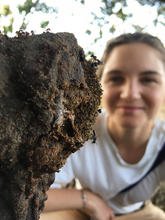Arboreal Apiculture Salon Recordings
Stream past podcast episodes from this page or subscribe in your podcast player of choice for automatic upload of new episodes to your device.
Most episodes include chapters, presentation images and info links. Podcast players that support chapter images include Overcast (iOS & macOS M1) and Pocket Casts ( iOS & Android).
Download Slides (Max 50MBytes)
Salon No. 32 With Peter Neumann
https://traffic.libsyn.com/secure/arboreal-apiculture-salon/Salon_32_Peter__Edit.mp3?dest-id=1692473
In this podcast we are joined by Prof. Peter Neumann, the Vinetum professor of the Institute of Bee Health at the University of Bern. His reaserach covers all aspects of all aspects of bee health with focus on behavioural, evolutionary and molecular ecology of honey bees and their pathogens. Peter has been the adjunct Professor, Faculty of Science, Chiang Mai University, Chiang Mai, Thailand, researching ectoparasitic mites Tropilaelaps spp. and Varroa spp. Peter has also been Chair of the research consortium “European honey bees surviving Varroa destructor by means of natural selection” that is comprised of eight research institutes from Belgium, France, Germany, Norway, Sweden, Switzerland and The Netherlands; Management. He is also president of the COLOSS association (www.coloss.org) (prevention of honey bee COlony LOSSes) that is currently comprised of >1500 members from >100 countries.
Salon No. 31 With Derek Mitchell
https://traffic.libsyn.com/secure/arboreal-apiculture-salon/Salon31-Derek__Final.mp3?dest-id=1692473

In this podcast we learn that through math(s) we can prove that some of our long held beliefs about honeybees are wrong. Derek Mitchell researches into the heat transfer of man-made and natural honeybee nests at the School of Mechanical Engineering of the University of Leeds where he has recently completed his Phd with a thesis entitled “The Thermofluid engineering of the honeybee nest (Apis Mellifera) . He has had articles published in Beecraft, Bee Culture, American Bee Journal and Natural Honey bee husbandry in addition to his published academic work in the Royal Society Journal and International Journal of Biometeorology. Recent papers include:
Publications:
Mitchell D (2023) Honeybees cluster together when it’s cold – but we’ve been completely wrong about why The Conversation November 24, 2023 https://theconversation.com/honeybees-cluster-together-when-its-cold-but-weve-been-completely-wrong-about-why-218066Mitchell, D.M. (2023_ Honey Bee Cluster – not insulation but stressful heat sink
Journal of the Royal Society Interface.
Mitchell, D.M. (2023). Are Man-Made Hives valid thermal surrogates for natural
Honey Bee nests [in review] Journal of Thermal Biology.
Mitchell, D.(2022) Honey bee ( Apis mellifera ) size determines colony heat transfer when brood covering or distributed,” Int. J. Biometeorol., vol. Accepted for publication.
Salon No. 30 Beelining with the experts
Beelining is an ancient craft and science of finding wild honeybee trees/nests. The pursuit is old as humankind and has gained new relevance for the conservation and rewilding of honeybees.
In Salon 30 we bring together international practitioners of beelining to share and explore current and innovative models of beelining. The panel includes Thomas Seeley (US), Benjamin Rutschmann (Germany), Chiara Binetti (IL), Lukas Taminen (US), Joe Ibbertson (UK) and our own Michael and Cheyanna. Join us for this very special event where we get to hear the latest approaches to this ancient craft from leading experts in the field.
Salon No. 29 with Maggie Shanahan

In Salon 29. we are joined by honeybee researcher Maggie Shanahan, and author of the 2022 paper “Honey Bees and Industrial Agriculture: What Researchers are Missing, and Why it’s a Problem” - Link. The conclusion of that paper offers a great introduction to our conversation with Maggie in this episode of the Salon:
"When honey bee researchers recognize industrial agriculture as the root cause of honey bee health issues, we open ourselves to the opportunity to collaborate meaningfully in these movements, and contribute to the future that must be built. We add our voices to the growing chorus that knows, and insists, that industrial agriculture is not the only way. It is one way. It is a way that we made. It is a thing we can change. The question is whether we open up and allow that change to happen through us, or dig in our heels until that change happens to us."
If you would like to discuss the episode with others join our telegram channel - Arboreal Apiculture Salon
Salon No. 28 with Grace McCormack
https://traffic.libsyn.com/secure/arboreal-apiculture-salon/Salon_28_Grace_Final.mp3?dest-id=1692473

This salon features special guest Grace McCormack. She is a Professor of Zoology at NUI Galway, Ireland. Her interests lie in evolutionary biology and particularly in using molecular data to understand how organisms are related to each other and the impacts this may have on the conservation and the evolution of organismal traits.
In this podcast Grace explores the question: Are wild bees distinct from those in managed colonies?
